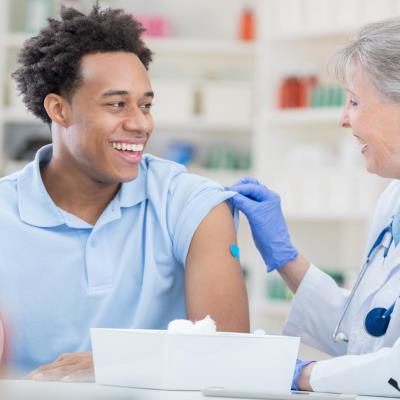Why Adult Immunizations Are Important Too
Posted August 20, 2018 by Thomas File, M.D. Infectious Diseases, Summa Health

August is National Immunization Awareness Month. While we mostly think of trips to our child’s primary care physician for shots, it’s very important to maintain our immunization record as we age. Even if you received all of the recommended vaccines as a child, the protection on certain immunizations can decrease over time. You could also be at a higher risk for certain diseases due to travel, job, age, lifestyle or other health conditions.
The flu shot is what most adults think about when it comes to recurring shots; but, did you know that each year thousands of American adults get sick from diseases that could have been prevented by vaccines?
A vaccine works with the body’s natural defenses to fight off certain diseases. Even if you do not have an increased risk factor for a certain disease, you are not only protecting yourself by getting vaccinated, you are protecting the people you come in contact with. We all have immunities to certain viruses but we can still carry them and infect others.
The CDC estimates that about 1 out of every 3 people in the U.S. will develop shingles in their lifetime. As you grow older, the severity of shingles can be quite debilitating and cause issues that last for years. Here are a few vaccines you should consider if you are an adult:
- Influenza: aka the flu shot. Even if you are one of those lucky people who don’t get the flu every year, consider those who aren’t as fortunate. You may be immune to certain strains of the flu but that does not eliminate your ability to carry the disease and pass it on to someone who may have chronic health conditions, be pregnant or older in age. The CDC strongly encourages everyone to get the flu shot every year.
- Tdap: the whooping cough vaccine. If you did not receive this shot during your adolescent years, you should consider getting it as an adult. It’s also recommended to get a booster shot every 10 years. Women are encouraged to get a vaccine during pregnancy, ideally between 27 - 36 weeks. Prolonged symptoms from whooping cough can lead to violent coughing episodes that can make it hard to breathe, eat or drink. It can also cause rib fractures from coughing and lead to pneumonia in adults but can cause serious, life-threatening illness in infants
- HP vaccine: this vaccine is most effective before sexual activity begins but can be given to both males and females up to the age of 26. It helps prevent against the human papillomavirus that causes most cervical cancers, anal cancer and genital warts.
- Shingrix: the new shingles shot. This vaccine is recommended for everyone over the age of 50. Unlike its friend chickenpox, shingles can appear more than once. This vaccine reduces the risk of shingles by more than 90 percent and can help prevent future occurrences if you’ve already had shingles. This new vaccine is recommended even for persons who have previously received the older shingles vaccine, Zostavax.
- Hepatitis A: protects against hepatitis A – a potentially serious liver disease that is spread through food and liquid contaminated with the virus.
- Hepatitis B: protects against hepatitis B - which is similar to A but needs a different vaccine. Hepatitis B is spread when blood, semen, or other body fluids enter the body of a person who is not infected.
- Pneumococcal: Pneumococcal disease most commonly is associated with acute pneumonia. Older adults are at greatest risk of serious illness or death. There are two kinds of vaccines that help prevent disease. Pneumococcal vaccine is recommended for all adults over 65 and adults between age 18 and 65 who have certain medical conditions (such as chronic heart or lung disease or diabetes)
To make an appointment with a primary care physician, call 800.237.8662.
About the Author
Vitality eNews Sign Up
Receive the Summa Health eNewsletter for the latest health tips, advice and updates.
